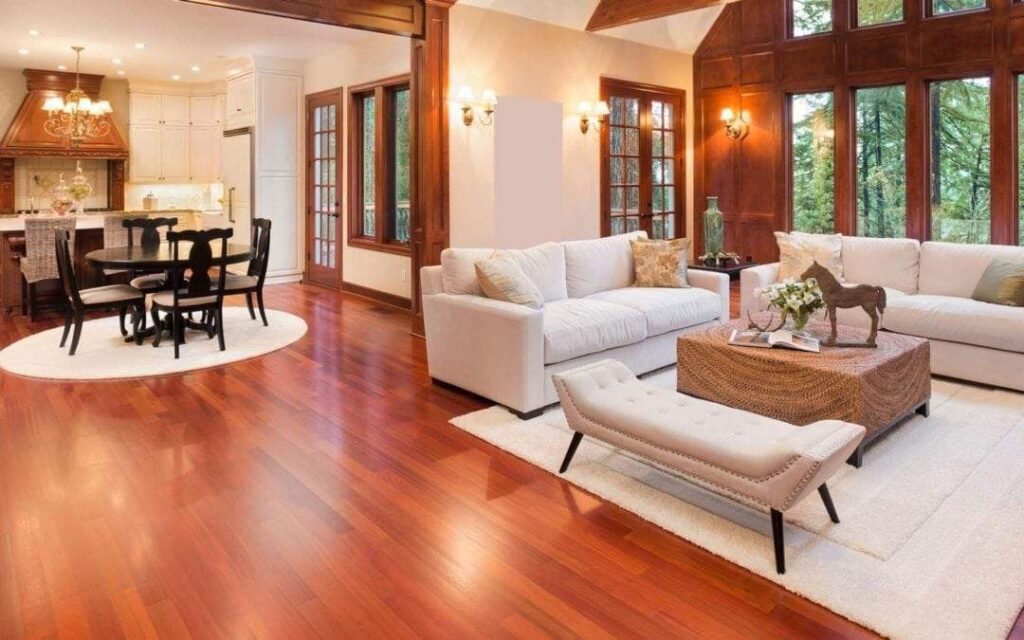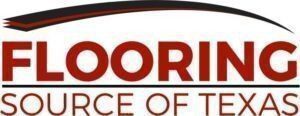The Source for All Your Flooring & Remodeling Needs!
Engineered Hardwood Flooring Pros and Cons
Engineered Hardwood Flooring Pros and Cons

Deciding on a flooring material is always difficult. There are so many to choose from, and each material comes with pros and cons that you’ll have to weigh. Right now, we’ll help you weigh engineered hardwood flooring pros and cons. When you’re done with the read, you should have all the information needed to decide whether the floor type is ideal for your Allen, TX home!
Pros
Extremely Durable
Durability is prioritized with engineered wood flooring. Each plank is layered to prevent wear and moisture penetration, and to expand and contract to prevent humidity effects.
Engineered hardwood is composed of a wear layer, a wood veneer, and a plywood layer. The wear layer fights against scratching, the wood veneer gives engineered wood its impressive appearance, and the plywood layer adds support and protects the core of each plank.
Together, the layers make the floor type very durable. It stands up against the main threats. Engineered hardwood flooring should lay strong for 10-15 years.
Impression of Traditional Hardwood
What’s cool about engineered wood flooring is it looks nearly identical to traditional hardwood. How so? The wood veneer is made up of real wood. The veneer can be made of oak, maple, walnut, cherry, hickory… whichever actual wood that you are drawn to.
In broad terms, an engineered plank typically features a top layer coated with clear polyurethane or aluminum oxide (known as the wear layer). Thus, the hardwood veneer shows through the top layer, giving the floor the appeal of actual solid hardwood floors.
House guests will think it is a solid hardwood floor. The sole method to distinguish between them is by placing an engineered plank alongside a solid hardwood plank. Even then it would be tough to tell the difference, at least from the overhead view.
Easy Installation
Unlike traditional hardwood, engineered hardwood is easy to install. The floor choice can be installed via the nail-down, glue-down or floating methods. The first two speak for themselves; a floating floor consists of connecting each plank by tongue and groove – like connecting puzzle pieces.
With floating being an option, engineered hardwood can be laid over a subfloor as long as the subfloor is flat and sturdy.
An engineered hardwood floor can be done as a DIY project. Though, if you are searching for perfection, it’s probably best you rely on a professional installation company. The install won’t take long and it won’t make nearly the mess that solid hardwood installation will make.
Simple Maintenance
It doesn’t take anything more than a damp mop to clean engineered hardwood. The surface is smooth and flat. You won’t have to worry about a coat of moisture like you would with solid wood flooring. Reason being, minimal moisture is no threat to engineered wood.
Furthermore, engineered hardwood is not stained like traditional hardwood. Therefore, it doesn’t have to be treated with specific chemicals like traditional hardwood.
Liquids won’t dry up inside any ridges and vacuums won’t scratch the surface if the bristles are mistakenly left in motion. Even steam cleaning is acceptable with an engineered hardwood floor.
More Affordable than Traditional Hardwood
Engineered hardwood looks like traditional hardwood, but it’s less expensive than traditional hardwood. The price difference is not substantial; however, engineered typically runs a few dollars less per square foot. It’s also considerably cheaper to install.
When matching quality, appearance, and price, it’s tough to turn away from an engineered hardwood floor. There’s a reason the type of floor has been in such high demand in recent years. With it being such a reliable floor, don’t expect the demand to lessen.
Cons
Refinishing is Limited at Best
Of the cons of engineered wood, this one is the most profound. Because the wood veneer is so thin, typically 0.5 – 1.0 mm, the opportunity to sand and refinish the surface is slim to non-existent.
A regular hardwood floor can be sanded and refinished multiple times because the surface is wood through and through. As a result, years will be added onto a hardwood floor.
Engineered hardwood does not have that luxury. However, some manufacturers offer wood veneers up to 2.0 mm in width. Such veneers may be able to be refinished once or twice.
Range of Material Quality
You do have to be careful when selecting an engineered hardwood floor. As the floor is layered, it’s essential the one you buy is made up of strong, trusty materials. The wear layer, veneer, plywood, and the adhesive used to put them together, need to be created and installed for the long-term purposes.
It won’t do you much good to buy a faulty floor. Just be sure to get all the details from a flooring expert. We promise the engineered hardwood sold at Flooring Source will keep form and last for a long time. We sell only the highest quality of products across the board.
Staining and Wood Grain are More Basic
Engineered hardwood looks like true hardwood, but it isn’t true hardwood. Thus, it will lack certain qualities in comparison. Staining is not relevant because the floor is covered with a wear layer. The grain is noticeable, though not as extreme as with true hardwood.
Again, it’s tough to tell these differences unless each floor type is laid next to the other, so homeowners rarely turn away due to standing and graining deficiencies.
Conclusion
Engineered Hardwood Flooring Pros and Cons, including durability, easy maintenance, and affordability, make it a worthy choice for your Allen, TX home. Flooring Source of Texas provides a reliable source for quality flooring, ensuring satisfaction and longevity.
Flooring Source of Texas
We hope the engineered hardwood flooring pros and cons gave you some clarity. If you are sold on the floor type, we encourage you to visit Flooring Source of Texas to get the process started with purchase and installation.
We always have plenty of engineered wood in stock, along with laminate flooring, tile, carpet and stone. Our flooring technicians are available to answer any questions that you may have!
FAQs
Q1: Is engineered hardwood as durable as traditional hardwood?
A1: Absolutely, engineered hardwood is crafted for durability, standing up effectively against wear and moisture – a key consideration in the Engineered Hardwood Flooring Pros and Cons.
Q2: Can I install engineered hardwood myself?
A2: Certainly, engineered hardwood is designed for easy installation. While it’s a viable DIY project, professional installation ensures perfection – an aspect to ponder in Engineered Hardwood Flooring Pros and Cons
Q3: How does engineered hardwood compare in price to traditional hardwood?
A3: Engineered hardwood is generally more affordable than traditional hardwood, making it a cost-effective choice as highlighted in the Engineered Hardwood Flooring Pros and Cons.
Q4: Can engineered hardwood be refinished?
A4: Refinishing options are limited due to the thin wood veneer, but some may allow for one or two refinishing sessions – a factor to consider in the Engineered Hardwood Flooring Pros and Cons.
Q5: Does Flooring Source of Texas offer other flooring options?
A5: Absolutely, Flooring Source of Texas provides a variety of flooring options, including laminate, tile, carpet, and stone. Explore the diverse choices beyond Engineered Hardwood Flooring Pros and Cons.
To learn more about our selection and our company in general, please visit https://flooringsourcetx.com.
Modernize your home by calling (972) 778-6855!

Areas we Service
Flower Mound, TX | Southlake, TX | Grapevine, TX | Keller, TX | Highland Village, TX | Lake Dallas, TX | Argyle, TX | Justin, TX | Allen, TX
contact us acceptable now
Organize (972) 778-6855 acceptable now to schedule your free estimate
As shortly as we see what’s going on on on on, we’ll make strategies and get the work scheduled.
